Dissertation: Research Methodology, Approaches, and Strategies
VerifiedAdded on 2023/05/30
|42
|10829
|350
Thesis and Dissertation
AI Summary
This dissertation chapter, specifically Chapter 3, meticulously details the research methodology employed. It begins by establishing the use of a primary quantitative methodology, specifically a survey technique with a questionnaire administered to 69 employees. The chapter then introduces the research onion, a framework encompassing philosophical stances (ontology, axiology, and epistemology), research approaches (deductive and inductive), and research strategies (experiment, survey, case study, action research, grounded theory, and ethnography). The chapter provides in-depth explanations of each layer of the research onion, including objectivism, pragmatism, constructivism, interpretivism, realism, and positivism within the philosophical stances. It further elucidates the deductive and inductive approaches and the different research strategies, highlighting their respective benefits and limitations. The chapter aims to provide a comprehensive guide to the methodological choices made in the dissertation, ensuring transparency and rigor in the research process.
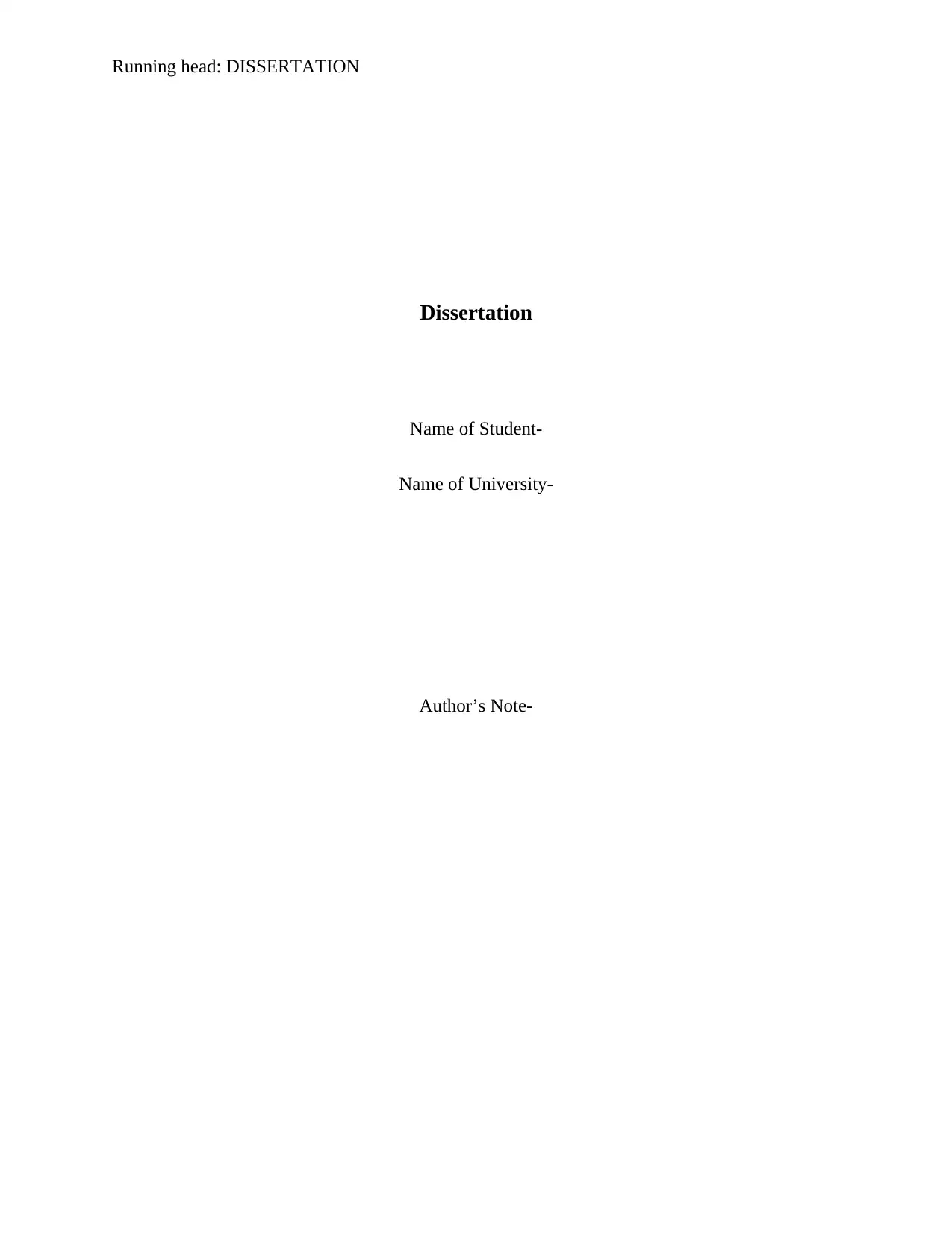
Running head: DISSERTATION
Dissertation
Name of Student-
Name of University-
Author’s Note-
Dissertation
Name of Student-
Name of University-
Author’s Note-
Paraphrase This Document
Need a fresh take? Get an instant paraphrase of this document with our AI Paraphraser
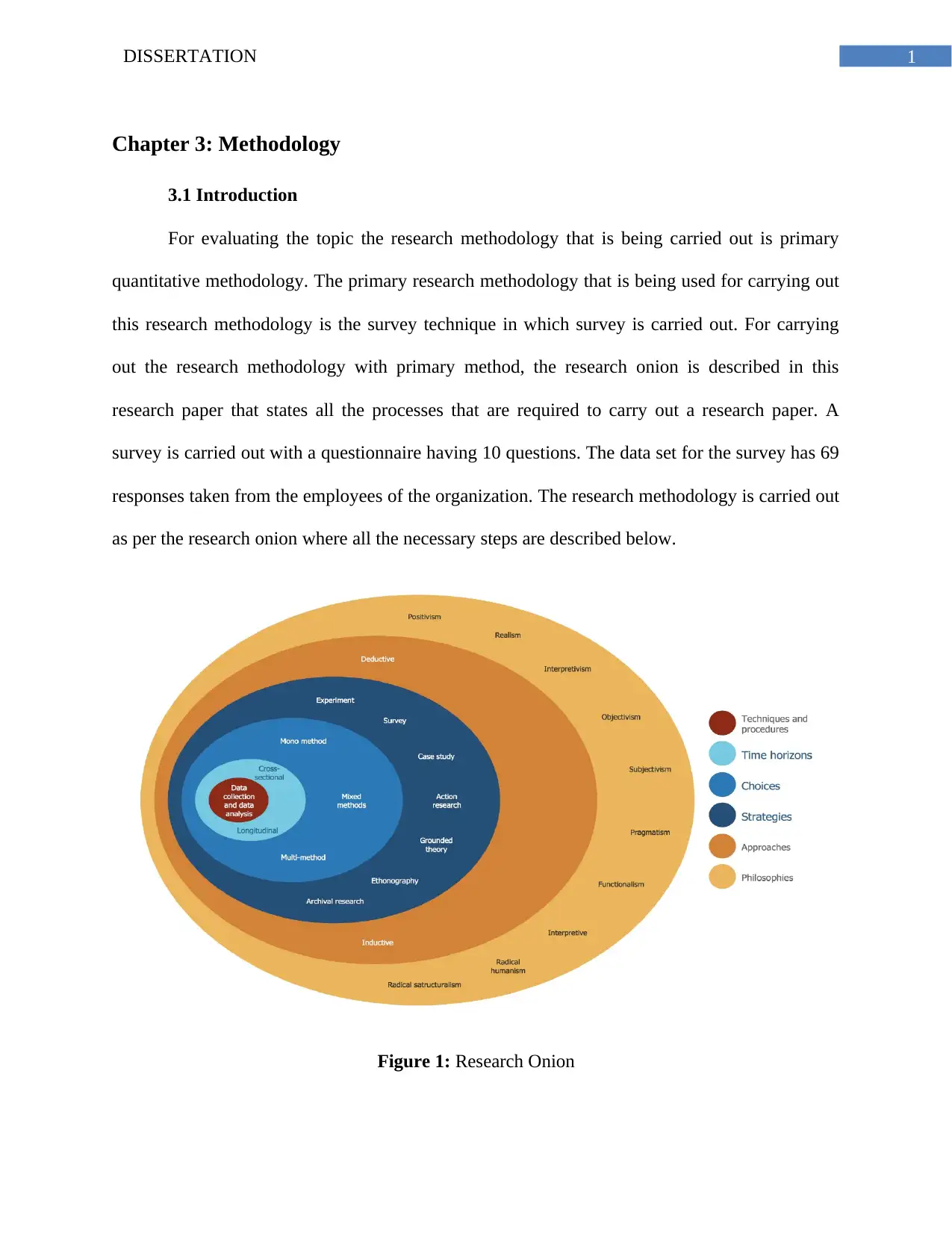
1DISSERTATION
Chapter 3: Methodology
3.1 Introduction
For evaluating the topic the research methodology that is being carried out is primary
quantitative methodology. The primary research methodology that is being used for carrying out
this research methodology is the survey technique in which survey is carried out. For carrying
out the research methodology with primary method, the research onion is described in this
research paper that states all the processes that are required to carry out a research paper. A
survey is carried out with a questionnaire having 10 questions. The data set for the survey has 69
responses taken from the employees of the organization. The research methodology is carried out
as per the research onion where all the necessary steps are described below.
Figure 1: Research Onion
Chapter 3: Methodology
3.1 Introduction
For evaluating the topic the research methodology that is being carried out is primary
quantitative methodology. The primary research methodology that is being used for carrying out
this research methodology is the survey technique in which survey is carried out. For carrying
out the research methodology with primary method, the research onion is described in this
research paper that states all the processes that are required to carry out a research paper. A
survey is carried out with a questionnaire having 10 questions. The data set for the survey has 69
responses taken from the employees of the organization. The research methodology is carried out
as per the research onion where all the necessary steps are described below.
Figure 1: Research Onion
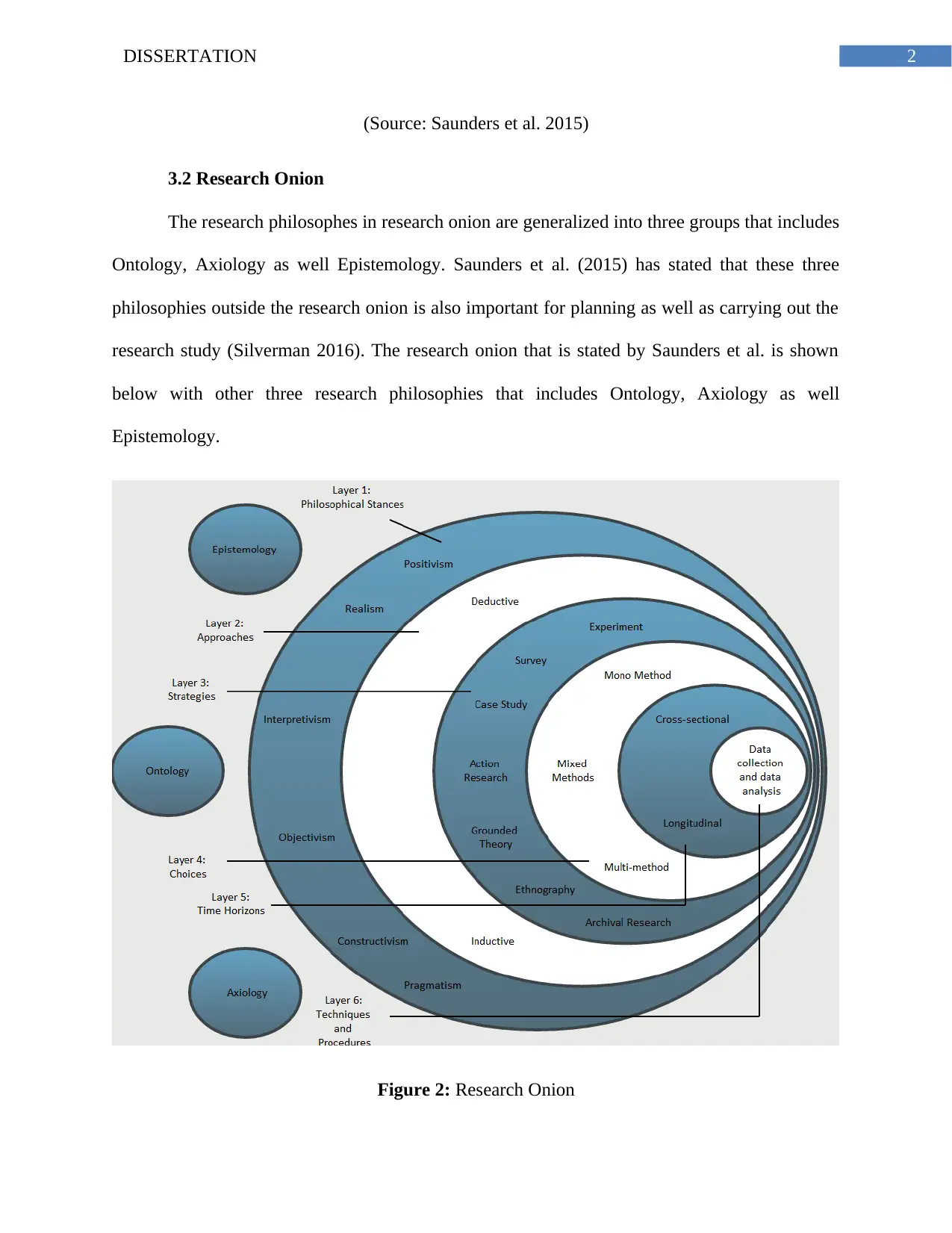
2DISSERTATION
(Source: Saunders et al. 2015)
3.2 Research Onion
The research philosophes in research onion are generalized into three groups that includes
Ontology, Axiology as well Epistemology. Saunders et al. (2015) has stated that these three
philosophies outside the research onion is also important for planning as well as carrying out the
research study (Silverman 2016). The research onion that is stated by Saunders et al. is shown
below with other three research philosophies that includes Ontology, Axiology as well
Epistemology.
Figure 2: Research Onion
(Source: Saunders et al. 2015)
3.2 Research Onion
The research philosophes in research onion are generalized into three groups that includes
Ontology, Axiology as well Epistemology. Saunders et al. (2015) has stated that these three
philosophies outside the research onion is also important for planning as well as carrying out the
research study (Silverman 2016). The research onion that is stated by Saunders et al. is shown
below with other three research philosophies that includes Ontology, Axiology as well
Epistemology.
Figure 2: Research Onion
⊘ This is a preview!⊘
Do you want full access?
Subscribe today to unlock all pages.

Trusted by 1+ million students worldwide
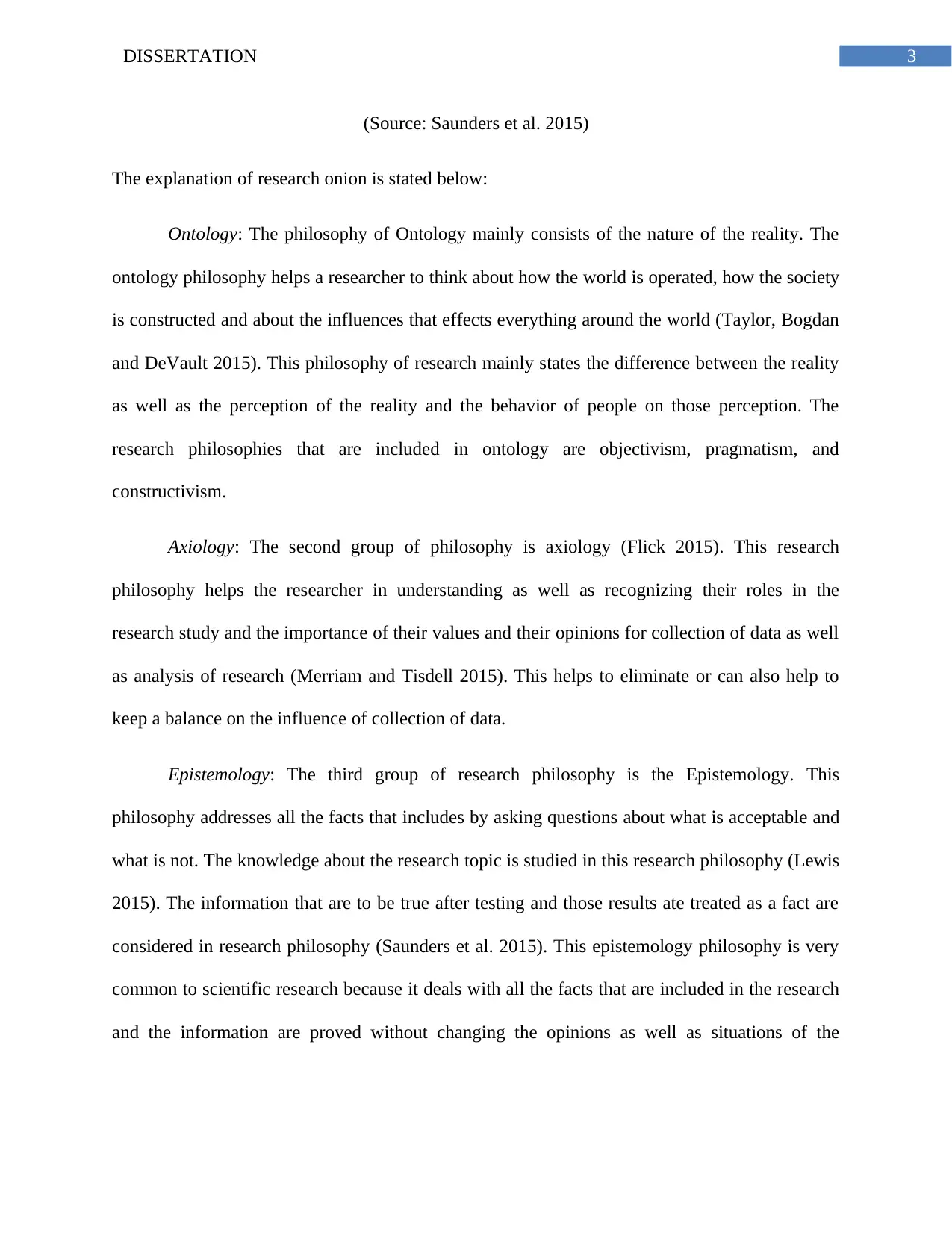
3DISSERTATION
(Source: Saunders et al. 2015)
The explanation of research onion is stated below:
Ontology: The philosophy of Ontology mainly consists of the nature of the reality. The
ontology philosophy helps a researcher to think about how the world is operated, how the society
is constructed and about the influences that effects everything around the world (Taylor, Bogdan
and DeVault 2015). This philosophy of research mainly states the difference between the reality
as well as the perception of the reality and the behavior of people on those perception. The
research philosophies that are included in ontology are objectivism, pragmatism, and
constructivism.
Axiology: The second group of philosophy is axiology (Flick 2015). This research
philosophy helps the researcher in understanding as well as recognizing their roles in the
research study and the importance of their values and their opinions for collection of data as well
as analysis of research (Merriam and Tisdell 2015). This helps to eliminate or can also help to
keep a balance on the influence of collection of data.
Epistemology: The third group of research philosophy is the Epistemology. This
philosophy addresses all the facts that includes by asking questions about what is acceptable and
what is not. The knowledge about the research topic is studied in this research philosophy (Lewis
2015). The information that are to be true after testing and those results ate treated as a fact are
considered in research philosophy (Saunders et al. 2015). This epistemology philosophy is very
common to scientific research because it deals with all the facts that are included in the research
and the information are proved without changing the opinions as well as situations of the
(Source: Saunders et al. 2015)
The explanation of research onion is stated below:
Ontology: The philosophy of Ontology mainly consists of the nature of the reality. The
ontology philosophy helps a researcher to think about how the world is operated, how the society
is constructed and about the influences that effects everything around the world (Taylor, Bogdan
and DeVault 2015). This philosophy of research mainly states the difference between the reality
as well as the perception of the reality and the behavior of people on those perception. The
research philosophies that are included in ontology are objectivism, pragmatism, and
constructivism.
Axiology: The second group of philosophy is axiology (Flick 2015). This research
philosophy helps the researcher in understanding as well as recognizing their roles in the
research study and the importance of their values and their opinions for collection of data as well
as analysis of research (Merriam and Tisdell 2015). This helps to eliminate or can also help to
keep a balance on the influence of collection of data.
Epistemology: The third group of research philosophy is the Epistemology. This
philosophy addresses all the facts that includes by asking questions about what is acceptable and
what is not. The knowledge about the research topic is studied in this research philosophy (Lewis
2015). The information that are to be true after testing and those results ate treated as a fact are
considered in research philosophy (Saunders et al. 2015). This epistemology philosophy is very
common to scientific research because it deals with all the facts that are included in the research
and the information are proved without changing the opinions as well as situations of the
Paraphrase This Document
Need a fresh take? Get an instant paraphrase of this document with our AI Paraphraser
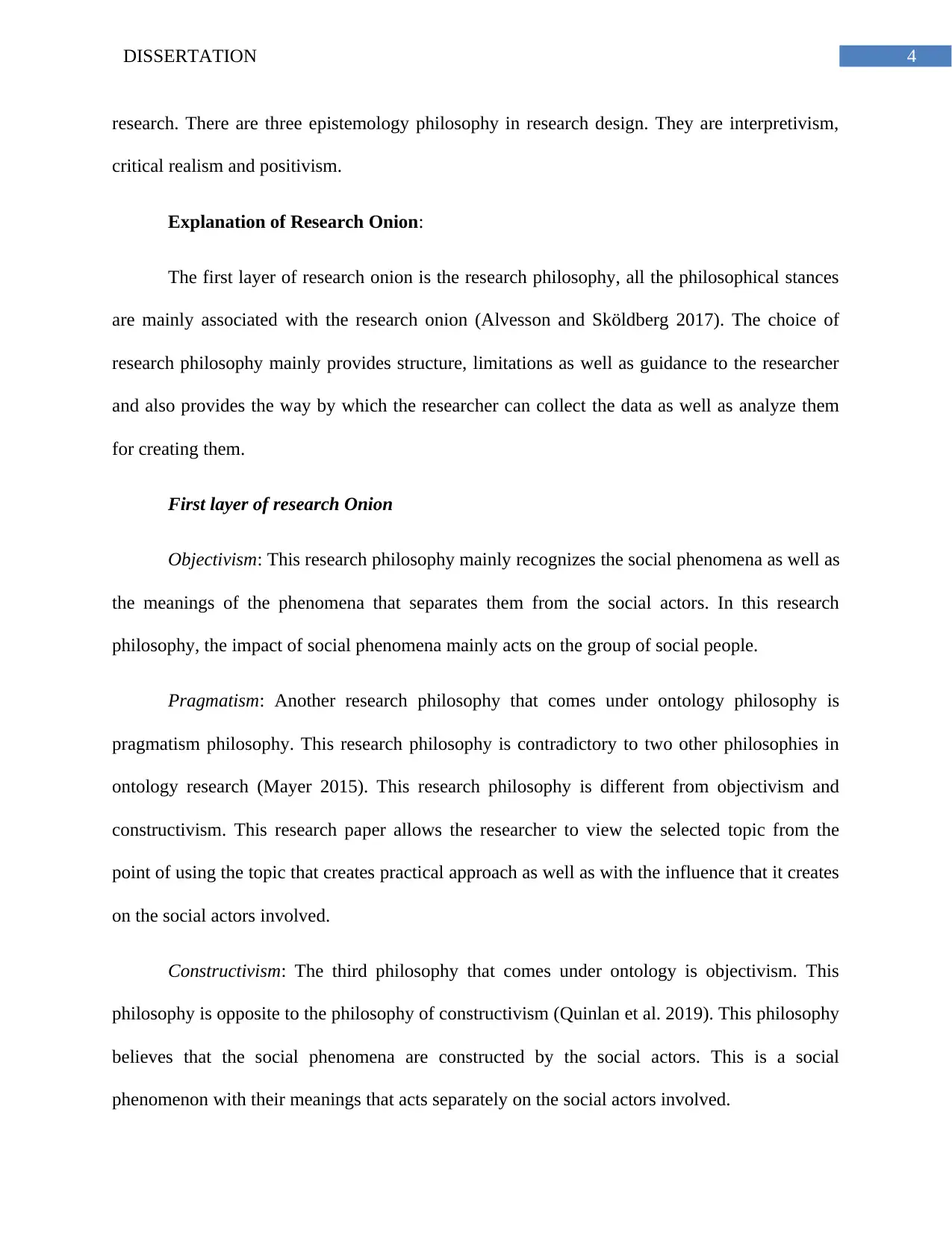
4DISSERTATION
research. There are three epistemology philosophy in research design. They are interpretivism,
critical realism and positivism.
Explanation of Research Onion:
The first layer of research onion is the research philosophy, all the philosophical stances
are mainly associated with the research onion (Alvesson and Sköldberg 2017). The choice of
research philosophy mainly provides structure, limitations as well as guidance to the researcher
and also provides the way by which the researcher can collect the data as well as analyze them
for creating them.
First layer of research Onion
Objectivism: This research philosophy mainly recognizes the social phenomena as well as
the meanings of the phenomena that separates them from the social actors. In this research
philosophy, the impact of social phenomena mainly acts on the group of social people.
Pragmatism: Another research philosophy that comes under ontology philosophy is
pragmatism philosophy. This research philosophy is contradictory to two other philosophies in
ontology research (Mayer 2015). This research philosophy is different from objectivism and
constructivism. This research paper allows the researcher to view the selected topic from the
point of using the topic that creates practical approach as well as with the influence that it creates
on the social actors involved.
Constructivism: The third philosophy that comes under ontology is objectivism. This
philosophy is opposite to the philosophy of constructivism (Quinlan et al. 2019). This philosophy
believes that the social phenomena are constructed by the social actors. This is a social
phenomenon with their meanings that acts separately on the social actors involved.
research. There are three epistemology philosophy in research design. They are interpretivism,
critical realism and positivism.
Explanation of Research Onion:
The first layer of research onion is the research philosophy, all the philosophical stances
are mainly associated with the research onion (Alvesson and Sköldberg 2017). The choice of
research philosophy mainly provides structure, limitations as well as guidance to the researcher
and also provides the way by which the researcher can collect the data as well as analyze them
for creating them.
First layer of research Onion
Objectivism: This research philosophy mainly recognizes the social phenomena as well as
the meanings of the phenomena that separates them from the social actors. In this research
philosophy, the impact of social phenomena mainly acts on the group of social people.
Pragmatism: Another research philosophy that comes under ontology philosophy is
pragmatism philosophy. This research philosophy is contradictory to two other philosophies in
ontology research (Mayer 2015). This research philosophy is different from objectivism and
constructivism. This research paper allows the researcher to view the selected topic from the
point of using the topic that creates practical approach as well as with the influence that it creates
on the social actors involved.
Constructivism: The third philosophy that comes under ontology is objectivism. This
philosophy is opposite to the philosophy of constructivism (Quinlan et al. 2019). This philosophy
believes that the social phenomena are constructed by the social actors. This is a social
phenomenon with their meanings that acts separately on the social actors involved.
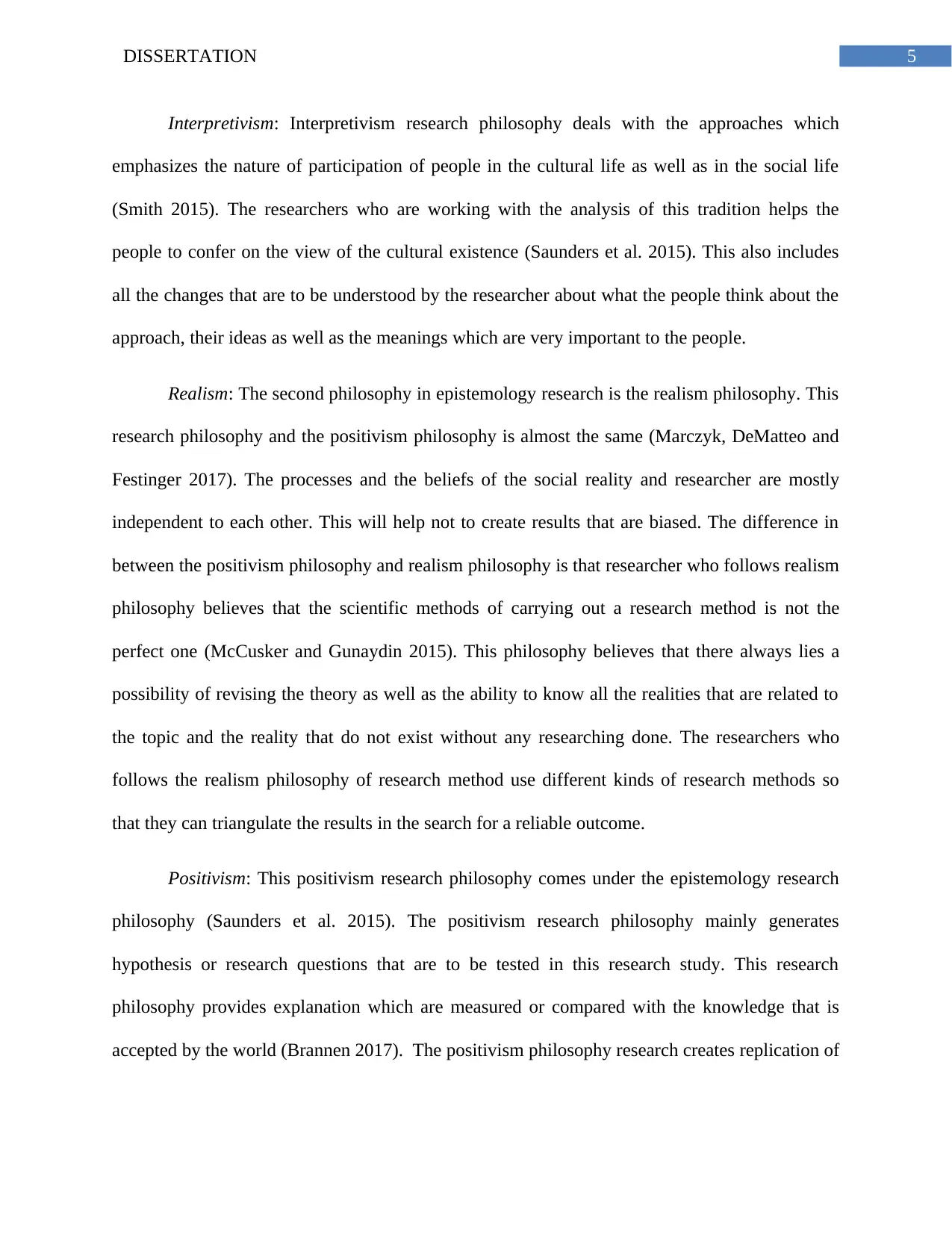
5DISSERTATION
Interpretivism: Interpretivism research philosophy deals with the approaches which
emphasizes the nature of participation of people in the cultural life as well as in the social life
(Smith 2015). The researchers who are working with the analysis of this tradition helps the
people to confer on the view of the cultural existence (Saunders et al. 2015). This also includes
all the changes that are to be understood by the researcher about what the people think about the
approach, their ideas as well as the meanings which are very important to the people.
Realism: The second philosophy in epistemology research is the realism philosophy. This
research philosophy and the positivism philosophy is almost the same (Marczyk, DeMatteo and
Festinger 2017). The processes and the beliefs of the social reality and researcher are mostly
independent to each other. This will help not to create results that are biased. The difference in
between the positivism philosophy and realism philosophy is that researcher who follows realism
philosophy believes that the scientific methods of carrying out a research method is not the
perfect one (McCusker and Gunaydin 2015). This philosophy believes that there always lies a
possibility of revising the theory as well as the ability to know all the realities that are related to
the topic and the reality that do not exist without any researching done. The researchers who
follows the realism philosophy of research method use different kinds of research methods so
that they can triangulate the results in the search for a reliable outcome.
Positivism: This positivism research philosophy comes under the epistemology research
philosophy (Saunders et al. 2015). The positivism research philosophy mainly generates
hypothesis or research questions that are to be tested in this research study. This research
philosophy provides explanation which are measured or compared with the knowledge that is
accepted by the world (Brannen 2017). The positivism philosophy research creates replication of
Interpretivism: Interpretivism research philosophy deals with the approaches which
emphasizes the nature of participation of people in the cultural life as well as in the social life
(Smith 2015). The researchers who are working with the analysis of this tradition helps the
people to confer on the view of the cultural existence (Saunders et al. 2015). This also includes
all the changes that are to be understood by the researcher about what the people think about the
approach, their ideas as well as the meanings which are very important to the people.
Realism: The second philosophy in epistemology research is the realism philosophy. This
research philosophy and the positivism philosophy is almost the same (Marczyk, DeMatteo and
Festinger 2017). The processes and the beliefs of the social reality and researcher are mostly
independent to each other. This will help not to create results that are biased. The difference in
between the positivism philosophy and realism philosophy is that researcher who follows realism
philosophy believes that the scientific methods of carrying out a research method is not the
perfect one (McCusker and Gunaydin 2015). This philosophy believes that there always lies a
possibility of revising the theory as well as the ability to know all the realities that are related to
the topic and the reality that do not exist without any researching done. The researchers who
follows the realism philosophy of research method use different kinds of research methods so
that they can triangulate the results in the search for a reliable outcome.
Positivism: This positivism research philosophy comes under the epistemology research
philosophy (Saunders et al. 2015). The positivism research philosophy mainly generates
hypothesis or research questions that are to be tested in this research study. This research
philosophy provides explanation which are measured or compared with the knowledge that is
accepted by the world (Brannen 2017). The positivism philosophy research creates replication of
⊘ This is a preview!⊘
Do you want full access?
Subscribe today to unlock all pages.

Trusted by 1+ million students worldwide
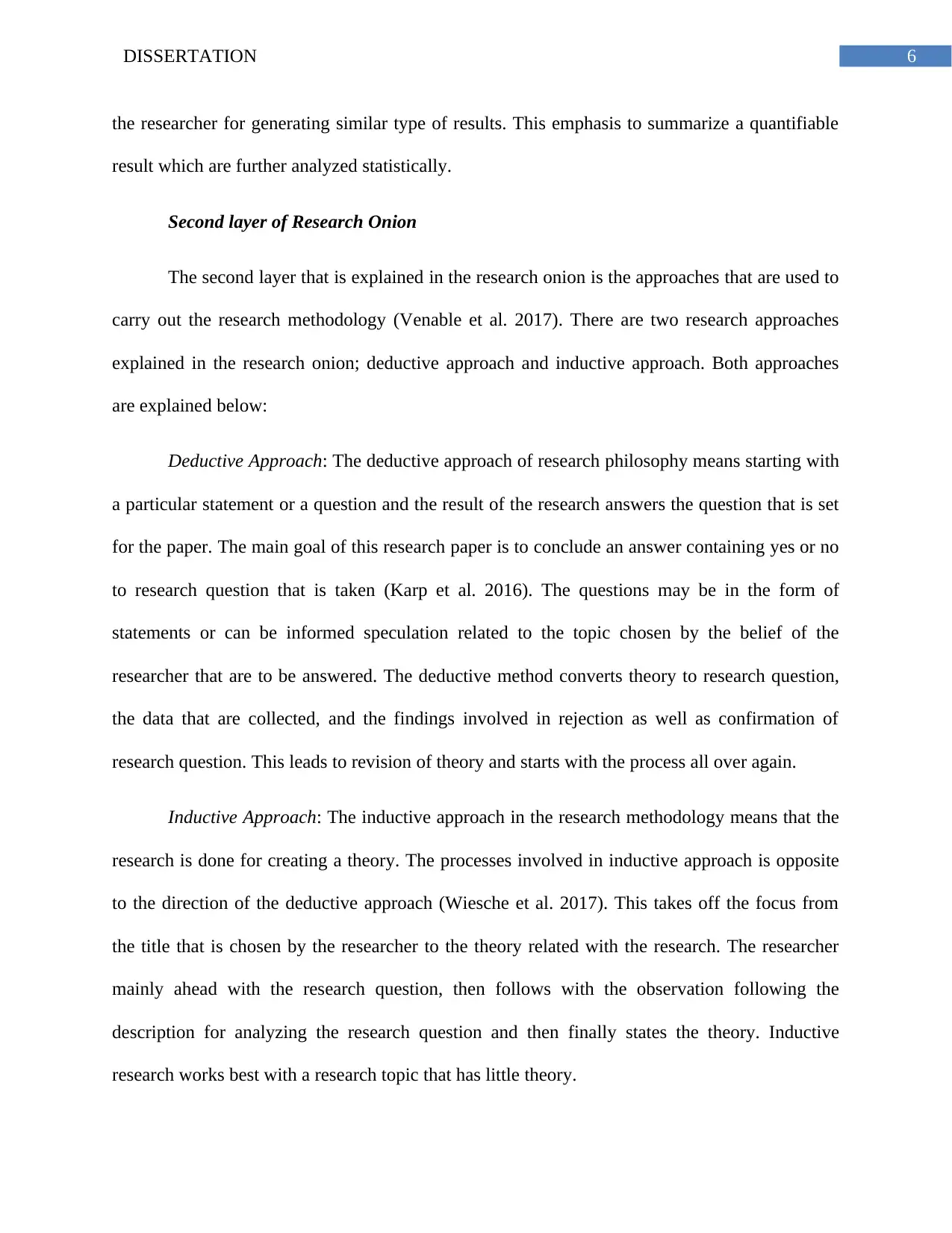
6DISSERTATION
the researcher for generating similar type of results. This emphasis to summarize a quantifiable
result which are further analyzed statistically.
Second layer of Research Onion
The second layer that is explained in the research onion is the approaches that are used to
carry out the research methodology (Venable et al. 2017). There are two research approaches
explained in the research onion; deductive approach and inductive approach. Both approaches
are explained below:
Deductive Approach: The deductive approach of research philosophy means starting with
a particular statement or a question and the result of the research answers the question that is set
for the paper. The main goal of this research paper is to conclude an answer containing yes or no
to research question that is taken (Karp et al. 2016). The questions may be in the form of
statements or can be informed speculation related to the topic chosen by the belief of the
researcher that are to be answered. The deductive method converts theory to research question,
the data that are collected, and the findings involved in rejection as well as confirmation of
research question. This leads to revision of theory and starts with the process all over again.
Inductive Approach: The inductive approach in the research methodology means that the
research is done for creating a theory. The processes involved in inductive approach is opposite
to the direction of the deductive approach (Wiesche et al. 2017). This takes off the focus from
the title that is chosen by the researcher to the theory related with the research. The researcher
mainly ahead with the research question, then follows with the observation following the
description for analyzing the research question and then finally states the theory. Inductive
research works best with a research topic that has little theory.
the researcher for generating similar type of results. This emphasis to summarize a quantifiable
result which are further analyzed statistically.
Second layer of Research Onion
The second layer that is explained in the research onion is the approaches that are used to
carry out the research methodology (Venable et al. 2017). There are two research approaches
explained in the research onion; deductive approach and inductive approach. Both approaches
are explained below:
Deductive Approach: The deductive approach of research philosophy means starting with
a particular statement or a question and the result of the research answers the question that is set
for the paper. The main goal of this research paper is to conclude an answer containing yes or no
to research question that is taken (Karp et al. 2016). The questions may be in the form of
statements or can be informed speculation related to the topic chosen by the belief of the
researcher that are to be answered. The deductive method converts theory to research question,
the data that are collected, and the findings involved in rejection as well as confirmation of
research question. This leads to revision of theory and starts with the process all over again.
Inductive Approach: The inductive approach in the research methodology means that the
research is done for creating a theory. The processes involved in inductive approach is opposite
to the direction of the deductive approach (Wiesche et al. 2017). This takes off the focus from
the title that is chosen by the researcher to the theory related with the research. The researcher
mainly ahead with the research question, then follows with the observation following the
description for analyzing the research question and then finally states the theory. Inductive
research works best with a research topic that has little theory.
Paraphrase This Document
Need a fresh take? Get an instant paraphrase of this document with our AI Paraphraser
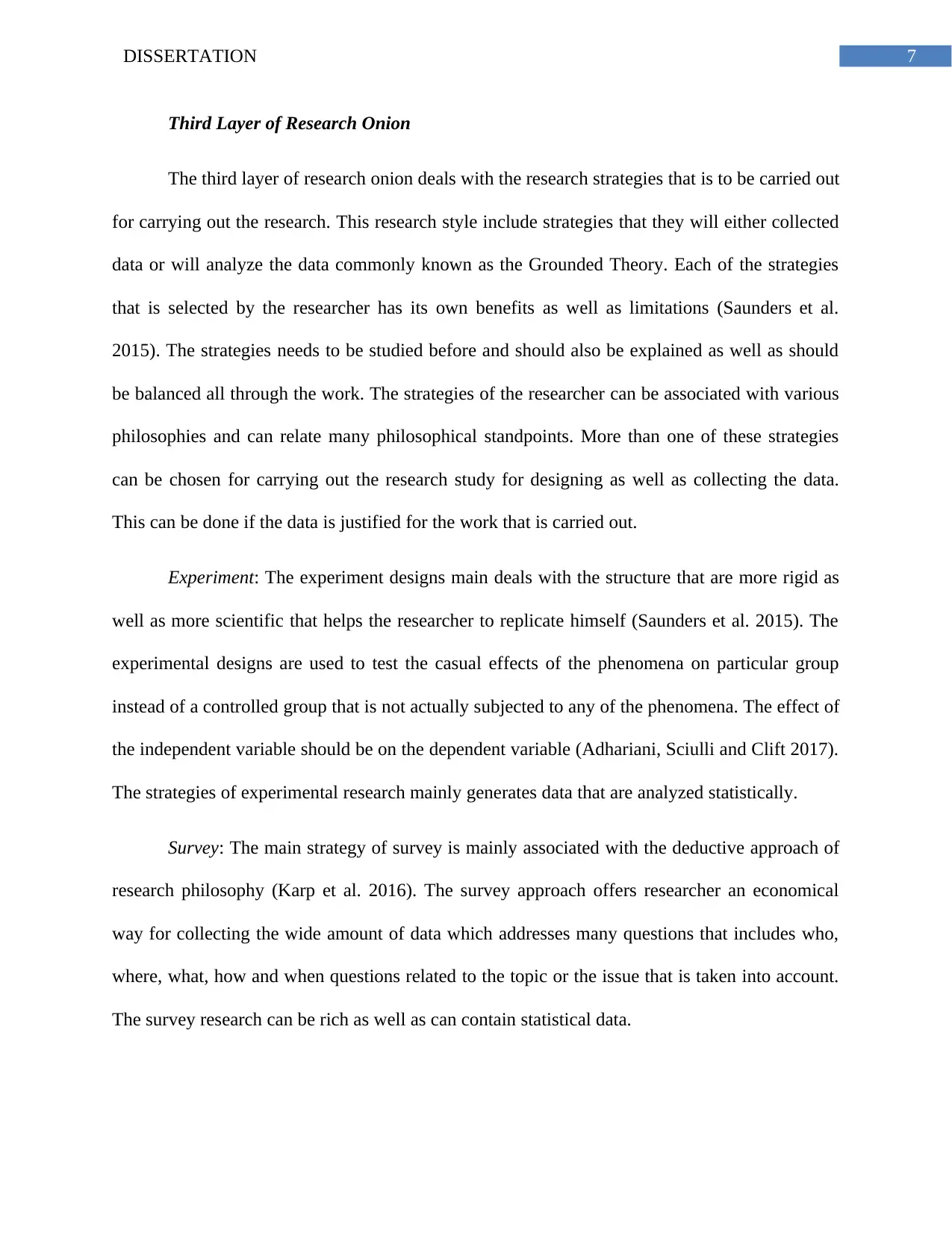
7DISSERTATION
Third Layer of Research Onion
The third layer of research onion deals with the research strategies that is to be carried out
for carrying out the research. This research style include strategies that they will either collected
data or will analyze the data commonly known as the Grounded Theory. Each of the strategies
that is selected by the researcher has its own benefits as well as limitations (Saunders et al.
2015). The strategies needs to be studied before and should also be explained as well as should
be balanced all through the work. The strategies of the researcher can be associated with various
philosophies and can relate many philosophical standpoints. More than one of these strategies
can be chosen for carrying out the research study for designing as well as collecting the data.
This can be done if the data is justified for the work that is carried out.
Experiment: The experiment designs main deals with the structure that are more rigid as
well as more scientific that helps the researcher to replicate himself (Saunders et al. 2015). The
experimental designs are used to test the casual effects of the phenomena on particular group
instead of a controlled group that is not actually subjected to any of the phenomena. The effect of
the independent variable should be on the dependent variable (Adhariani, Sciulli and Clift 2017).
The strategies of experimental research mainly generates data that are analyzed statistically.
Survey: The main strategy of survey is mainly associated with the deductive approach of
research philosophy (Karp et al. 2016). The survey approach offers researcher an economical
way for collecting the wide amount of data which addresses many questions that includes who,
where, what, how and when questions related to the topic or the issue that is taken into account.
The survey research can be rich as well as can contain statistical data.
Third Layer of Research Onion
The third layer of research onion deals with the research strategies that is to be carried out
for carrying out the research. This research style include strategies that they will either collected
data or will analyze the data commonly known as the Grounded Theory. Each of the strategies
that is selected by the researcher has its own benefits as well as limitations (Saunders et al.
2015). The strategies needs to be studied before and should also be explained as well as should
be balanced all through the work. The strategies of the researcher can be associated with various
philosophies and can relate many philosophical standpoints. More than one of these strategies
can be chosen for carrying out the research study for designing as well as collecting the data.
This can be done if the data is justified for the work that is carried out.
Experiment: The experiment designs main deals with the structure that are more rigid as
well as more scientific that helps the researcher to replicate himself (Saunders et al. 2015). The
experimental designs are used to test the casual effects of the phenomena on particular group
instead of a controlled group that is not actually subjected to any of the phenomena. The effect of
the independent variable should be on the dependent variable (Adhariani, Sciulli and Clift 2017).
The strategies of experimental research mainly generates data that are analyzed statistically.
Survey: The main strategy of survey is mainly associated with the deductive approach of
research philosophy (Karp et al. 2016). The survey approach offers researcher an economical
way for collecting the wide amount of data which addresses many questions that includes who,
where, what, how and when questions related to the topic or the issue that is taken into account.
The survey research can be rich as well as can contain statistical data.
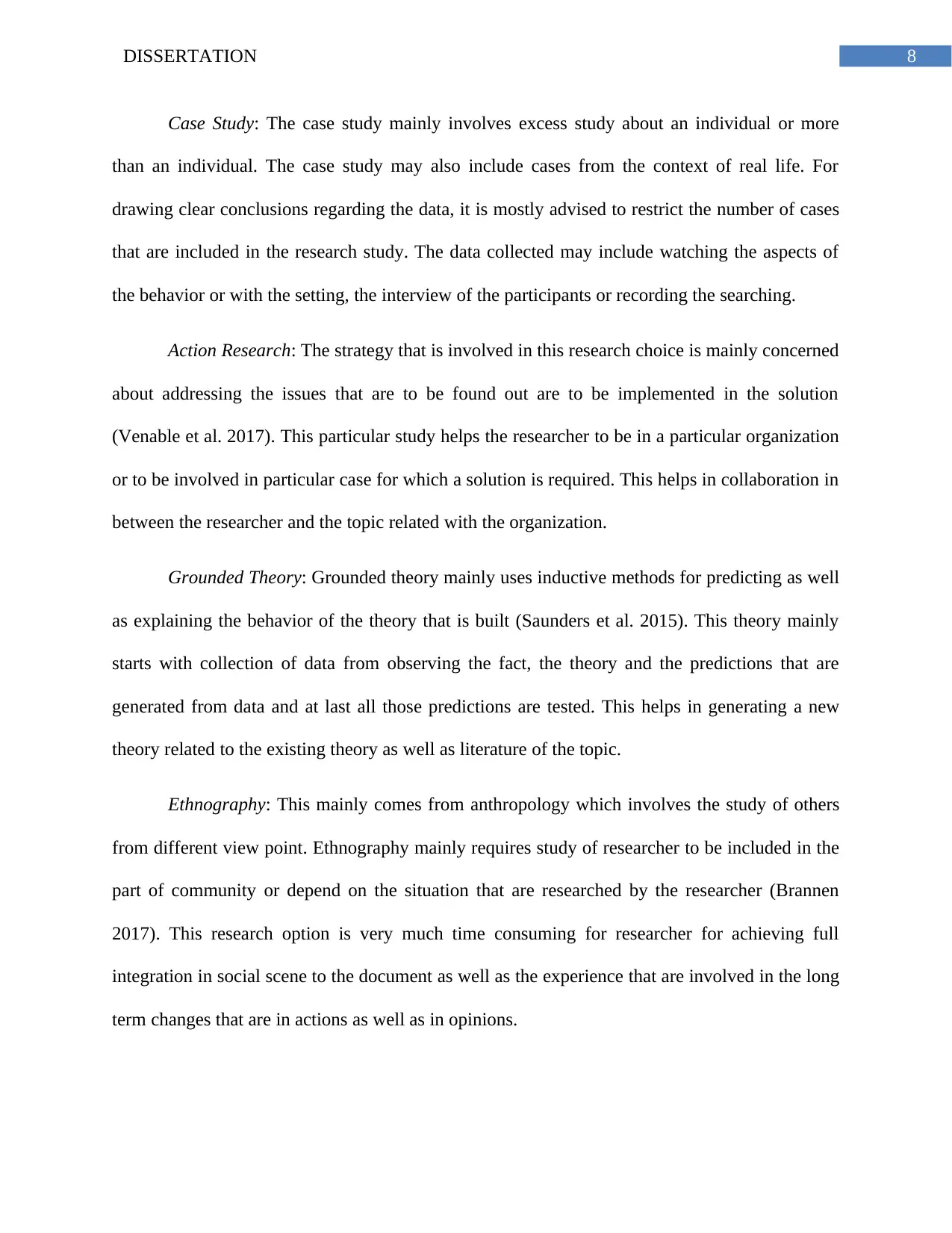
8DISSERTATION
Case Study: The case study mainly involves excess study about an individual or more
than an individual. The case study may also include cases from the context of real life. For
drawing clear conclusions regarding the data, it is mostly advised to restrict the number of cases
that are included in the research study. The data collected may include watching the aspects of
the behavior or with the setting, the interview of the participants or recording the searching.
Action Research: The strategy that is involved in this research choice is mainly concerned
about addressing the issues that are to be found out are to be implemented in the solution
(Venable et al. 2017). This particular study helps the researcher to be in a particular organization
or to be involved in particular case for which a solution is required. This helps in collaboration in
between the researcher and the topic related with the organization.
Grounded Theory: Grounded theory mainly uses inductive methods for predicting as well
as explaining the behavior of the theory that is built (Saunders et al. 2015). This theory mainly
starts with collection of data from observing the fact, the theory and the predictions that are
generated from data and at last all those predictions are tested. This helps in generating a new
theory related to the existing theory as well as literature of the topic.
Ethnography: This mainly comes from anthropology which involves the study of others
from different view point. Ethnography mainly requires study of researcher to be included in the
part of community or depend on the situation that are researched by the researcher (Brannen
2017). This research option is very much time consuming for researcher for achieving full
integration in social scene to the document as well as the experience that are involved in the long
term changes that are in actions as well as in opinions.
Case Study: The case study mainly involves excess study about an individual or more
than an individual. The case study may also include cases from the context of real life. For
drawing clear conclusions regarding the data, it is mostly advised to restrict the number of cases
that are included in the research study. The data collected may include watching the aspects of
the behavior or with the setting, the interview of the participants or recording the searching.
Action Research: The strategy that is involved in this research choice is mainly concerned
about addressing the issues that are to be found out are to be implemented in the solution
(Venable et al. 2017). This particular study helps the researcher to be in a particular organization
or to be involved in particular case for which a solution is required. This helps in collaboration in
between the researcher and the topic related with the organization.
Grounded Theory: Grounded theory mainly uses inductive methods for predicting as well
as explaining the behavior of the theory that is built (Saunders et al. 2015). This theory mainly
starts with collection of data from observing the fact, the theory and the predictions that are
generated from data and at last all those predictions are tested. This helps in generating a new
theory related to the existing theory as well as literature of the topic.
Ethnography: This mainly comes from anthropology which involves the study of others
from different view point. Ethnography mainly requires study of researcher to be included in the
part of community or depend on the situation that are researched by the researcher (Brannen
2017). This research option is very much time consuming for researcher for achieving full
integration in social scene to the document as well as the experience that are involved in the long
term changes that are in actions as well as in opinions.
⊘ This is a preview!⊘
Do you want full access?
Subscribe today to unlock all pages.

Trusted by 1+ million students worldwide
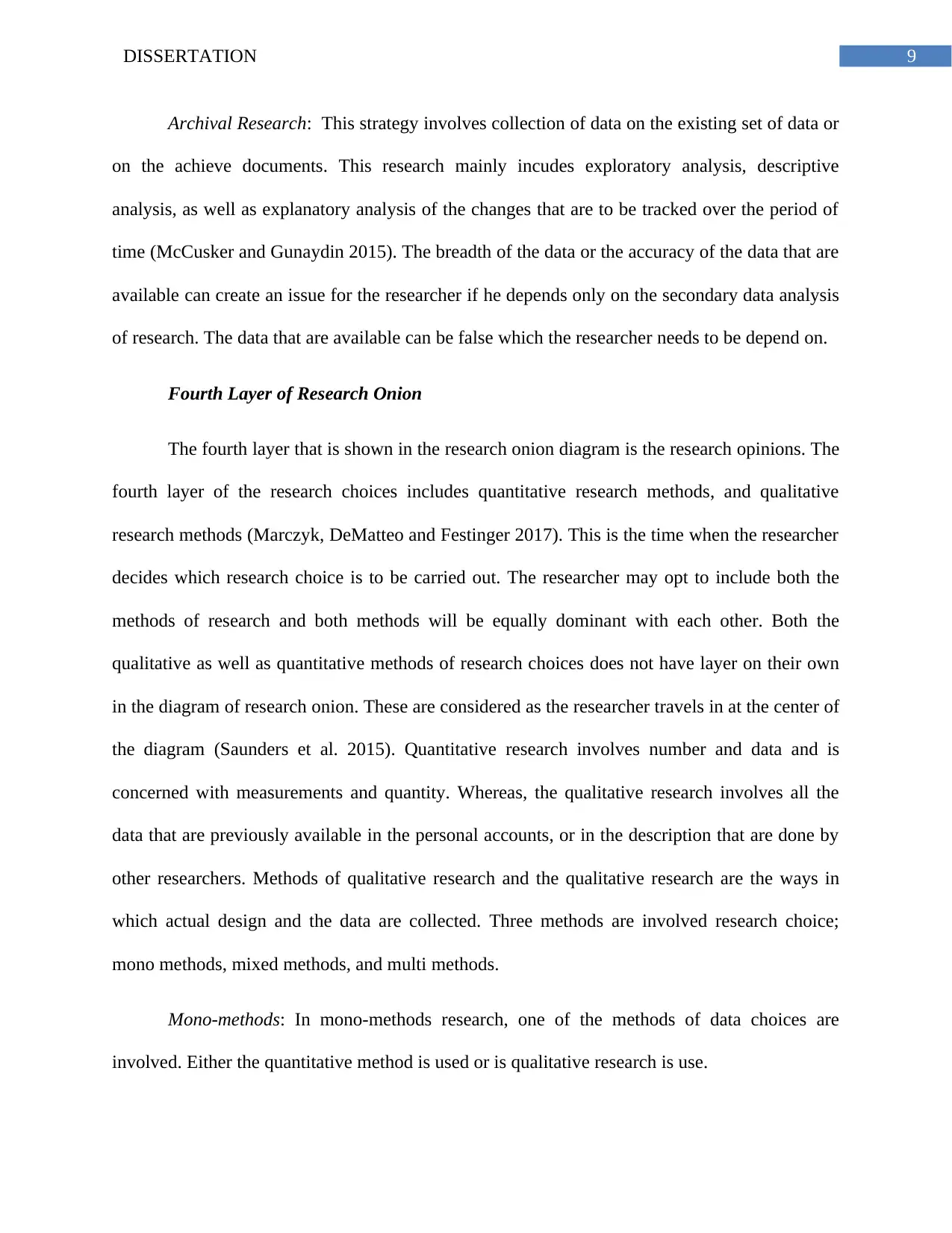
9DISSERTATION
Archival Research: This strategy involves collection of data on the existing set of data or
on the achieve documents. This research mainly incudes exploratory analysis, descriptive
analysis, as well as explanatory analysis of the changes that are to be tracked over the period of
time (McCusker and Gunaydin 2015). The breadth of the data or the accuracy of the data that are
available can create an issue for the researcher if he depends only on the secondary data analysis
of research. The data that are available can be false which the researcher needs to be depend on.
Fourth Layer of Research Onion
The fourth layer that is shown in the research onion diagram is the research opinions. The
fourth layer of the research choices includes quantitative research methods, and qualitative
research methods (Marczyk, DeMatteo and Festinger 2017). This is the time when the researcher
decides which research choice is to be carried out. The researcher may opt to include both the
methods of research and both methods will be equally dominant with each other. Both the
qualitative as well as quantitative methods of research choices does not have layer on their own
in the diagram of research onion. These are considered as the researcher travels in at the center of
the diagram (Saunders et al. 2015). Quantitative research involves number and data and is
concerned with measurements and quantity. Whereas, the qualitative research involves all the
data that are previously available in the personal accounts, or in the description that are done by
other researchers. Methods of qualitative research and the qualitative research are the ways in
which actual design and the data are collected. Three methods are involved research choice;
mono methods, mixed methods, and multi methods.
Mono-methods: In mono-methods research, one of the methods of data choices are
involved. Either the quantitative method is used or is qualitative research is use.
Archival Research: This strategy involves collection of data on the existing set of data or
on the achieve documents. This research mainly incudes exploratory analysis, descriptive
analysis, as well as explanatory analysis of the changes that are to be tracked over the period of
time (McCusker and Gunaydin 2015). The breadth of the data or the accuracy of the data that are
available can create an issue for the researcher if he depends only on the secondary data analysis
of research. The data that are available can be false which the researcher needs to be depend on.
Fourth Layer of Research Onion
The fourth layer that is shown in the research onion diagram is the research opinions. The
fourth layer of the research choices includes quantitative research methods, and qualitative
research methods (Marczyk, DeMatteo and Festinger 2017). This is the time when the researcher
decides which research choice is to be carried out. The researcher may opt to include both the
methods of research and both methods will be equally dominant with each other. Both the
qualitative as well as quantitative methods of research choices does not have layer on their own
in the diagram of research onion. These are considered as the researcher travels in at the center of
the diagram (Saunders et al. 2015). Quantitative research involves number and data and is
concerned with measurements and quantity. Whereas, the qualitative research involves all the
data that are previously available in the personal accounts, or in the description that are done by
other researchers. Methods of qualitative research and the qualitative research are the ways in
which actual design and the data are collected. Three methods are involved research choice;
mono methods, mixed methods, and multi methods.
Mono-methods: In mono-methods research, one of the methods of data choices are
involved. Either the quantitative method is used or is qualitative research is use.
Paraphrase This Document
Need a fresh take? Get an instant paraphrase of this document with our AI Paraphraser
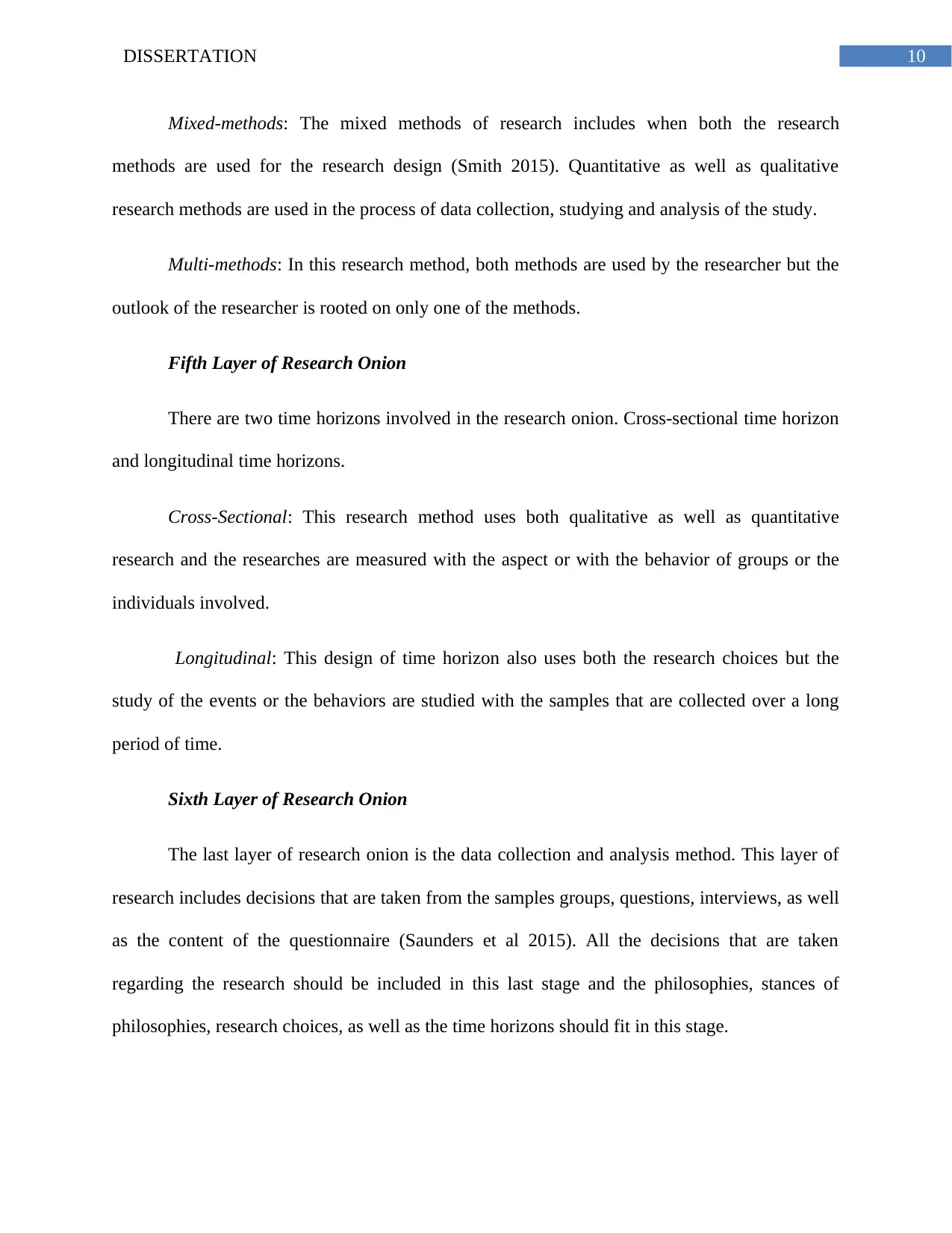
10DISSERTATION
Mixed-methods: The mixed methods of research includes when both the research
methods are used for the research design (Smith 2015). Quantitative as well as qualitative
research methods are used in the process of data collection, studying and analysis of the study.
Multi-methods: In this research method, both methods are used by the researcher but the
outlook of the researcher is rooted on only one of the methods.
Fifth Layer of Research Onion
There are two time horizons involved in the research onion. Cross-sectional time horizon
and longitudinal time horizons.
Cross-Sectional: This research method uses both qualitative as well as quantitative
research and the researches are measured with the aspect or with the behavior of groups or the
individuals involved.
Longitudinal: This design of time horizon also uses both the research choices but the
study of the events or the behaviors are studied with the samples that are collected over a long
period of time.
Sixth Layer of Research Onion
The last layer of research onion is the data collection and analysis method. This layer of
research includes decisions that are taken from the samples groups, questions, interviews, as well
as the content of the questionnaire (Saunders et al 2015). All the decisions that are taken
regarding the research should be included in this last stage and the philosophies, stances of
philosophies, research choices, as well as the time horizons should fit in this stage.
Mixed-methods: The mixed methods of research includes when both the research
methods are used for the research design (Smith 2015). Quantitative as well as qualitative
research methods are used in the process of data collection, studying and analysis of the study.
Multi-methods: In this research method, both methods are used by the researcher but the
outlook of the researcher is rooted on only one of the methods.
Fifth Layer of Research Onion
There are two time horizons involved in the research onion. Cross-sectional time horizon
and longitudinal time horizons.
Cross-Sectional: This research method uses both qualitative as well as quantitative
research and the researches are measured with the aspect or with the behavior of groups or the
individuals involved.
Longitudinal: This design of time horizon also uses both the research choices but the
study of the events or the behaviors are studied with the samples that are collected over a long
period of time.
Sixth Layer of Research Onion
The last layer of research onion is the data collection and analysis method. This layer of
research includes decisions that are taken from the samples groups, questions, interviews, as well
as the content of the questionnaire (Saunders et al 2015). All the decisions that are taken
regarding the research should be included in this last stage and the philosophies, stances of
philosophies, research choices, as well as the time horizons should fit in this stage.
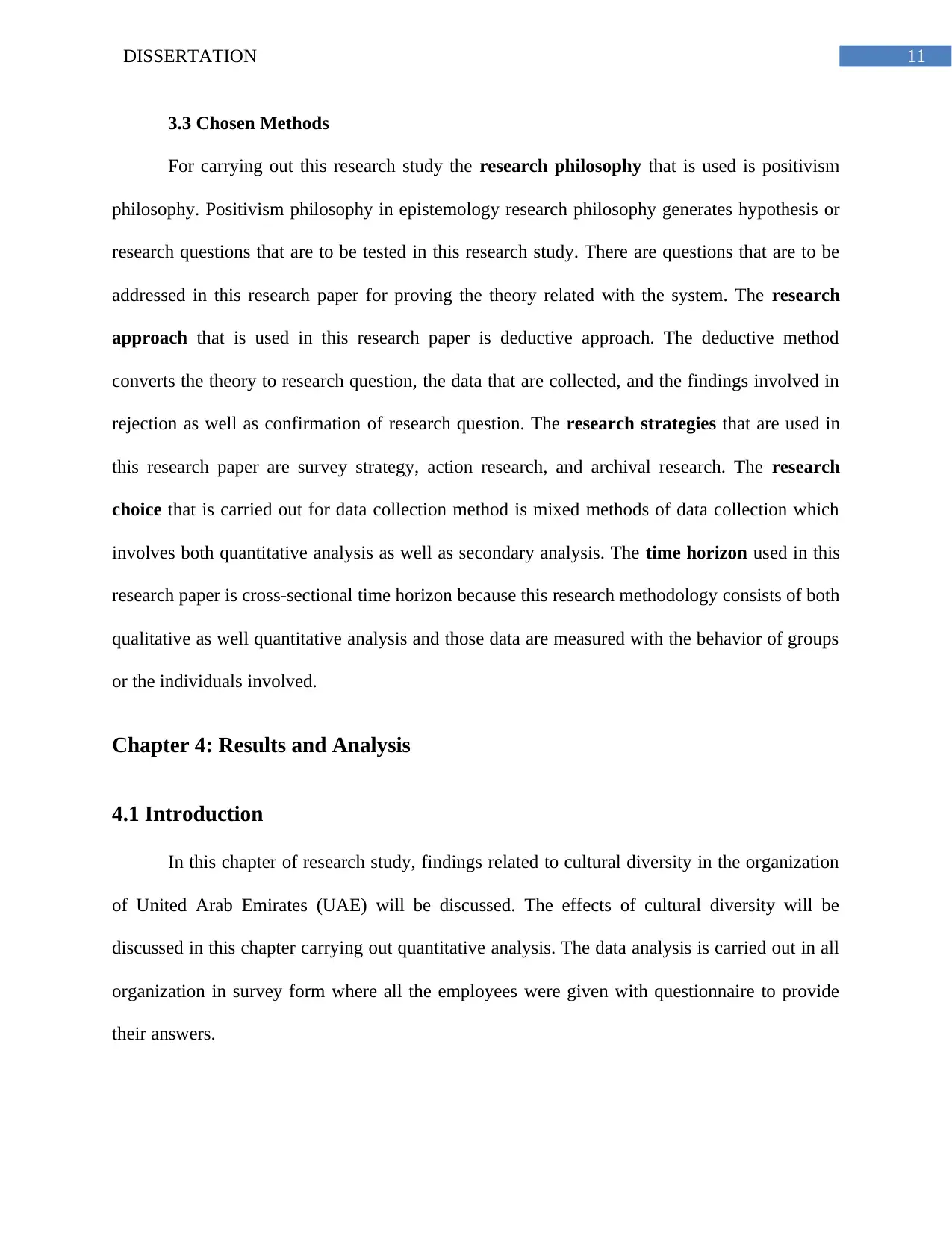
11DISSERTATION
3.3 Chosen Methods
For carrying out this research study the research philosophy that is used is positivism
philosophy. Positivism philosophy in epistemology research philosophy generates hypothesis or
research questions that are to be tested in this research study. There are questions that are to be
addressed in this research paper for proving the theory related with the system. The research
approach that is used in this research paper is deductive approach. The deductive method
converts the theory to research question, the data that are collected, and the findings involved in
rejection as well as confirmation of research question. The research strategies that are used in
this research paper are survey strategy, action research, and archival research. The research
choice that is carried out for data collection method is mixed methods of data collection which
involves both quantitative analysis as well as secondary analysis. The time horizon used in this
research paper is cross-sectional time horizon because this research methodology consists of both
qualitative as well quantitative analysis and those data are measured with the behavior of groups
or the individuals involved.
Chapter 4: Results and Analysis
4.1 Introduction
In this chapter of research study, findings related to cultural diversity in the organization
of United Arab Emirates (UAE) will be discussed. The effects of cultural diversity will be
discussed in this chapter carrying out quantitative analysis. The data analysis is carried out in all
organization in survey form where all the employees were given with questionnaire to provide
their answers.
3.3 Chosen Methods
For carrying out this research study the research philosophy that is used is positivism
philosophy. Positivism philosophy in epistemology research philosophy generates hypothesis or
research questions that are to be tested in this research study. There are questions that are to be
addressed in this research paper for proving the theory related with the system. The research
approach that is used in this research paper is deductive approach. The deductive method
converts the theory to research question, the data that are collected, and the findings involved in
rejection as well as confirmation of research question. The research strategies that are used in
this research paper are survey strategy, action research, and archival research. The research
choice that is carried out for data collection method is mixed methods of data collection which
involves both quantitative analysis as well as secondary analysis. The time horizon used in this
research paper is cross-sectional time horizon because this research methodology consists of both
qualitative as well quantitative analysis and those data are measured with the behavior of groups
or the individuals involved.
Chapter 4: Results and Analysis
4.1 Introduction
In this chapter of research study, findings related to cultural diversity in the organization
of United Arab Emirates (UAE) will be discussed. The effects of cultural diversity will be
discussed in this chapter carrying out quantitative analysis. The data analysis is carried out in all
organization in survey form where all the employees were given with questionnaire to provide
their answers.
⊘ This is a preview!⊘
Do you want full access?
Subscribe today to unlock all pages.

Trusted by 1+ million students worldwide
1 out of 42
Related Documents
Your All-in-One AI-Powered Toolkit for Academic Success.
+13062052269
info@desklib.com
Available 24*7 on WhatsApp / Email
![[object Object]](/_next/static/media/star-bottom.7253800d.svg)
Unlock your academic potential
Copyright © 2020–2026 A2Z Services. All Rights Reserved. Developed and managed by ZUCOL.





